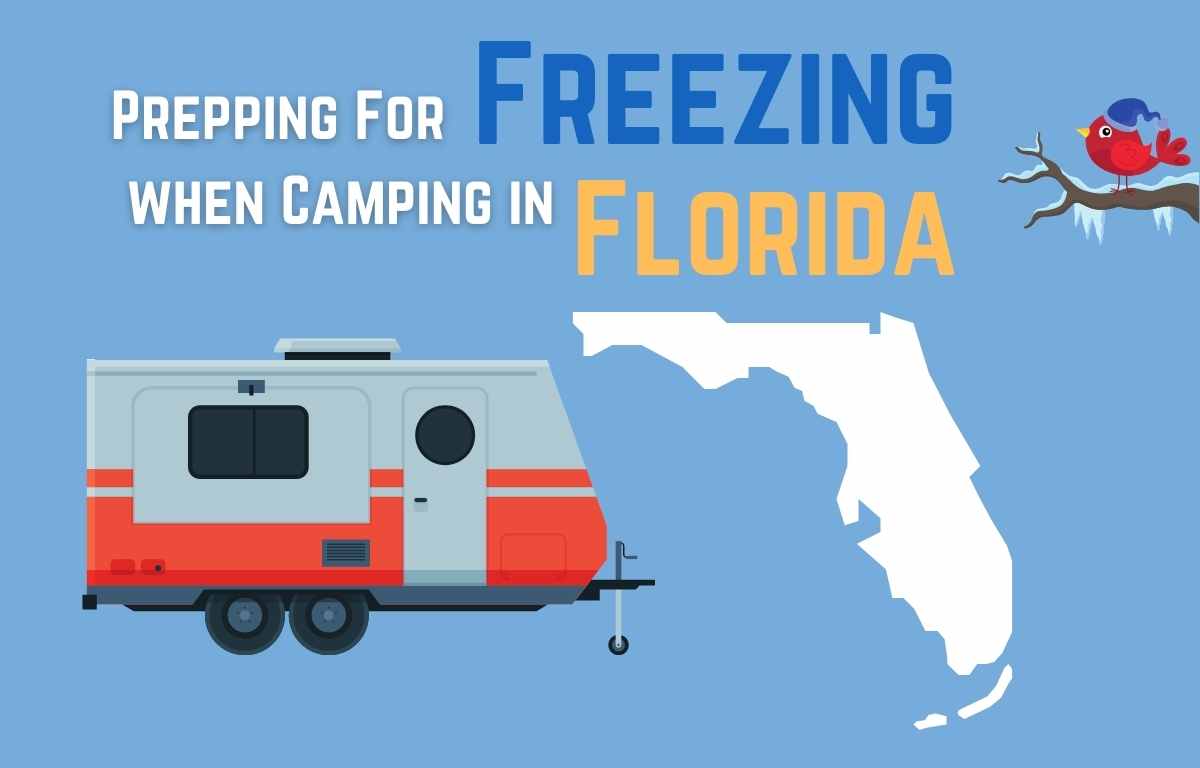What do you do when the forecast calls for temperatures to drop below freezing overnight while you’re camping in your RV? Are you worried about water lines freezing? Will you be warm enough? How cold is too cold? Don’t worry. We have some answers for you.

For people camping in the winter in areas where temperatures typically drop below freezing, the chances are that they have done some research and have made plans to deal with the cold temperatures. However, what about folks who weren’t expecting to deal with freezing temperatures? How do you prepare, and do you need to be worried?
Freezing temperatures and water
This issue is probably the most significant concern for most people when temperatures drop below freezing. Of course, we all know that water pipes and freezing temperatures don’t play nicely together. However, unless you’re camping with sustained temperatures below freezing, you won’t have much to worry about if you take a few simple precautions.
The first thing to remember is that water lines take time to freeze. If the temperature hits 32 degrees Fahrenheit, your water won’t instantly freeze. It will typically take several hours of sustained below-freezing temperatures to cause issues.
Additionally, when it’s below freezing outside, the water lines enclosed in your RV will are not exposed to those cold outside temperatures. This fact is especially true if you have an enclosed underbelly. If you’re RV has a heated underbelly, you really won’t have much to worry about if the temperatures are dropping below freezing overnight, assuming you’re running your furnace.
The water most prone to freezing is your city water hose connection. If you don’t have a heated hose, you can quickly remedy this situation by disconnecting your city water connection and bringing the hose inside. You can easily store it overnight in your shower. Then, when temperatures rise above freezing, reconnect it.
If you need water during the night, fill up your freshwater tank and use your RV pump. However, unless the temperature will be below freezing for more than the night, it’s easiest to skip this step and fill up a few pots of water to flush the toilet.
Let’s look at the following scenario:
You’re camping in Florida, and an extreme cold front is in the forecast. Temperatures are going to drop to 25 degrees overnight for 8 hours. What do you do?
In this scenario, don’t worry. The best plan of action is to do the following:
- Disconnect your city water hose, bring it inside, and store it in the shower.
- Fill up a gallon or two of water in a pot or jug in case you need it overnight.
- Use your RV furnace during the night, especially if you have a heated underbelly.
- If you have an enclosed underbelly, but it’s not heated, don’t worry. For this short duration, your lines won’t freeze.
- Run a space heater or electric fireplace if you want for comfort.
That’s all you need to do. However, if temperatures are below freezing for a more extended period (more than a day), you may want to make sure that your underbelly stays warm and use your fresh water tank.
Below are a few answers to some frequent questions when temps drop below freezing overnight:
Do I need to let my water drip from my faucet?
No, you do not need to let it drip. However, if you’re keeping your hose connected, dripping won’t always prevent your hose from freezing. The better option is to disconnect your city water hose and wait to reconnect it in the morning when the temperature rises above freezing.
Will my grey, black, or freshwater tanks freeze?
No, they won’t freeze. It would take very cold temperatures well below freezing and hours for your tanks to freeze. This situation is also assuming that you’re not heating your RV. For example, if you are running your furnace at night, and it warms your underbelly, there is no chance that your tanks will freeze.
What do I do with my sewer line?
Nothing. Just leave it be. Even if there is a little water in the line, it won’t hurt anything if it manages to freeze. If you want, you can always go outside and lift the line to try and drain some of the water. However, the chances are that it won’t freeze.
How do I stay warm inside?
If you have a heated underbelly, it’s a good idea to run the furnace overnight, at least intermittently. If you have an electric space heater, feel free to supplement your furnace with this heat. I like to keep my furnace set at 65 and use a space heater in the bedroom if it gets really cold.
Conclusion:
If you’re in an area like Florida that rarely sees temperatures below freezing, you may feel underprepared. However, look at the forecast and see how long it will stay below freezing. Most likely, it will just be for the nighttime hours. When the sun rises, the temperature will likely do the same. If you’re just looking at temperatures below freezing for a few hours, you really don’t need to worry too much. Your RV will be fine and your water lines won’t freeze. In most instances, the only thing you need to do is just disconnect your city water hose. Best of luck and stay warm.

Thank You for the helpful info, we are snowbirds here in Florida and they have had 22 degree temps at night so it does get cold spells and last year it lasted for almost a week. Just wanted to get how low temp goes like that what to do. Ty! again
You’re very welcome. Stay warm!
I would disconnect the hose at night and run the furnace. You can bring the hose in and put it in your shower so you can connect it the next day when temps rise above freezing.